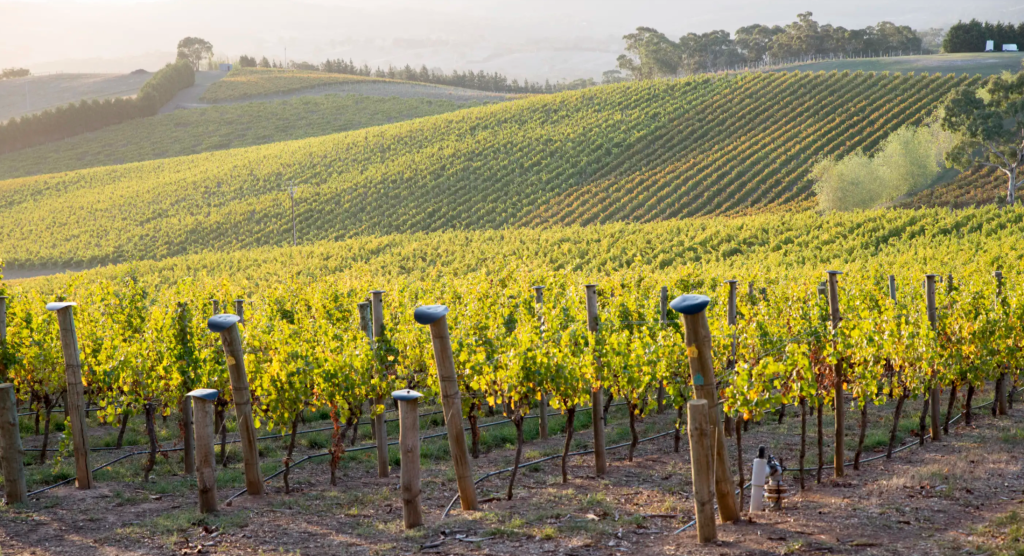
Chinese tariffs put pause on vineyard expansion
Huge tariffs imposed by China on major Australian winemakers including Penfolds producer Treasury Wine Estates have put the brakes on vineyard expansion activity and could affect values too, according to agents and valuers.
A lack of backpacker casual labour to pick fruit at harvest time is also proving a headache for grape-growers and winemakers as are expectations that grape prices this year will be down on 2020.
“It is clear that the market is taking a wait-and-see attitude, particularly on the Chinese trade issues,” says Colliers national director of agribusiness and vineyard specialist Tim Altschwager.
“Transactions completing in the first quarter of 2021 have achieved solid results. However, there is a perception that values will fall due to the China trade restrictions,” says Altschwager, who is selling the extensive portfolio of wineries, vineyards, stock and brands of the collapsed McWilliam’s Wines Group.
“The market is still assessing the potential implications and is taking a conservative view. Investment into the sector is likely to slow down through 2021, however investors and operators taking a longer-term view will continue to be active.”
Since the start of the pandemic, major commercial vineyard transactions have been few and far between.
Some that stand out include the sale of the renowned Bass Phillip estate in South Leongatha, Gippsland, home to Australia’s most expensive pinot noir. It was bought by a group of investors that included Burgundian winemaker Jean-Marie Fourrier, Singaporean businessman Soo Hoo Khoon Peng and Hong Kong/San Francisco-based venture capitalist Kent Ho.
Over in the NSW Hunter Valley, where demand for vineyards has been boosted by wealthy Sydneysiders seeking a reprieve from city life, the well-known Krinklewood organic vineyard, plus winery and cellar door, sold for about $5.5 million including stock while the former Black Cluster vineyard, renowned for its old shiraz vines and once owned by French beverage giant Pernod Ricard, sold for about the same price to “wine industry people” from Sydney.
However, the failed private equity takeover of the McWilliam’s Wines Group, one of the biggest and best known in the county, in late 2020 highlighted the challenges facing the industry from the additional tariffs imposed on Australian-imported wines.
The group’s assets are now due to be split with Calabria Family Wines to acquire more than 75 per cent of the McWilliam’s Wines operations, including the Hanwood Estate winery and brands near Griffith. The Medich Family Office will buy the smaller Mount Pleasant winery and brand in the Hunter Valley.
Writing in valuation firm Herron Todd White’s March 2021 property report, national director of agribusiness Tim Lane said there had been less activity in the table and wine grape sector.
“Any growers with plans to expand appear to be keeping their powder dryfor now due to concerns of price reduction, export trade concerns, lack of available workers to pick the fruit along with the real possibility that some fruit may remain unsold,” says Lane.
According to HTW, wine grape growers are already bracing for lower prices for red grape varieties, and there is nervousness among table grape and citrus growers due to their heavy reliance on the Chinese market.
Veteran vineyard and winery broker Toby Langley, of Langley & Co, is selling two wineries on behalf of Accolade, one of the country’s largest wine companies and owned by private equity firm The Carlyle Group.
They are the Petaluma winery, vineyard and cellar door in the Adelaide Hills priced between $6 million and $10 million and its historical Krondorf winery and cellar door in the Barossa Valley, tipped to sell for more than $3 million.
Despite the current challenges, Langley says prices are holding up.
“The market is steady, with reasonable levels of the demand and limited stock available,” he says.
“Industry fundamentals are driving demand, with buyers seeking to secure supply and strategic assets to match their long term business objectives.
“Demand is quite widely spread across key regions of South Australia, Victoria, Western Australia and Tasmania.”
He adds that technology is playing a significant role the vineyard and winery sector in terms of improving yields and returns.
“This is happening in the areas of water use and water requirements, plant and soil health for vineyards and energy usage and reducing filtration losses in the winery,” Langley says.
Colliers’ Altschwager, who is also selling the Stonehaven Winery and Norfolk Rise Wines on SA’s Limestone Coast, says there remains “reasonably strong” appetite for premium quality vineyards, large-scale production facilities and well-positioned brands in recognised wine regions.
“There are essentially two types of active buyers: private equity, corporate and institutional investors looking to purchase large holdings with a long-term lease or a working relationship to a wine industry operator, or established wine operators looking to expand their holdings,” he says.
As an example of institutional appetite, in December last year New Zealand sovereign wealth the NZ Superannution Fund acquired four vineyards in Marlborough for $31 million from Yealands Wine Group.
Covering a combined 187 hectares and planted primarily with sauvignon blanc and pinot noir grapes, the vineyards will be run by FarmRight, manager of the NZ Super Fund’s rural portfolio in New Zealand.
In Australia, a major challenge remains the lack of casual labour to pick fruit. Before the pandemic, overseas backpackers on temporary working holiday visas helped fill the void but with international borders closed, that pool of workers has disappeared.
According to the Department of Agriculture (ABARES), a large fall in the supply of overseas workers is expected to reduce the supply of horticultural produce in 2020-21 and 2021-22.
“The supply of overseas workers on Working Holiday Maker visas and from the seasonal worker program declined significantly following the introduction of COVID-19 containment measures, which curtailed international travel,” the department states.
“The major impact was on the number of working holidaymakers, which fell by 64 per cent in 2020 to around 61,000.”
A bigger issue though remains the China tariffs. China accounts for 82 per cent of the demand for exported shiraz and cabernet wines.
Until that situation is resolved – winemakers are pushing for the Morrison government to raise China’s punitive tariffs on the industry – growers will be holding back while they source alternative markets.
“While the news to impose tariffs of up to 212 per cent on Australian winemakers will be devastating for our industry, it is still too early to predict what the true or accurate consequences are going to be,” says winemaker Andrew Calabria, of Calabria Family Wines, who is president of the Riverina Winemakers Association.











